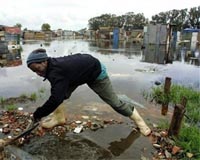| . |  |
. |
Sydney (AFP) June 6, 2010 Weather-related catastrophes brought about by climate change are increasing, the top UN humanitarian official said Sunday as he warned of the possibility of "mega-disasters". John Holmes, the UN Under-Secretary General for Humanitarian Affairs, said one of the biggest challenges facing the aid community was the problems stemming from changing weather patterns. "When it comes meteorological disasters, weather-related disasters, then there is a trend upwards connected with climate change," Holmes, who is in Australia for high-level talks on humanitarian aid, told AFP. "The trend is there is terms of floods, and cyclones, and droughts." Holmes, who is the UN's emergency relief coordinator, said it had been a tough year due to January's devastating earthquake in Haiti, which killed more than 250,000 people. He said while earthquakes, such as the 7.0-magnitude quake which levelled the Haitian capital Port-au-Prince, were random, weather-related natural disasters were increasing in number and scale. "It's partly the very obvious things like the number of cyclones and the intensity of the cyclones, and the amount of flooding," he said. "But is also in slightly more invisible ways -- in Africa with drought spreading, desertification spreading." Holmes said officials were particularly concerned about places where a combination of factors -- such as large populations, or likelihood of earthquake, or susceptibility to rising sea levels -- made them more vulnerable. "One of things we worry about is mega cities could produce, at some point, a mega disaster," he said. "Cities like Kathmandu for example, which sits on two earthquake faults, where a large earthquake will come along... and the results could be catastrophic." Holmes said while some countries were well-prepared for disaster -- such as Chile which was hit with a massive 8.8-magnitude earthquake in February which left 520 people dead -- others such as Haiti were less able to manage. "That's one of the reasons we want to focus on not just how we respond to disaster, we need to do that, but how you reduce the impact of those disasters before they happen," Holmes siad. In Haiti, the situation remained serious, he said, with some 1.5 million people living in makeshift shelters and little prospect of this changing soon. "There are real concerns about how vulnerable people still are, despite all the efforts that have been made," he said. Holmes said the need for humanitarian aid was rising faster than resources were available, particularly given the long-running conflicts in areas such as Sudan's Darfur and the Democratic Republic of Congo. At the same time, climate change would likely set in chain migration due to drought or rising sea levels or conflicts due to a scarcity of water or arable land in coming years and these would place more pressure on funds. "So all these things are going to create more problems for us, and we're really just coming to grips with what the consequences might be," Holmes said. "And you can construct some extremely scary scenarios for yourself without too much trouble. "For example, about what the effect might be of glaciers melting in the Himalayas. Now we don't quite know whether that's happening, or will happen, or not. But if it did, what would the effect be on the major river systems of southern Asia?" Holmes said while a decade ago, climate change was not on officials' radars, "now it's on everybody's agenda." "Climate change for us is not some future indeterminate threat, it's happening in front of our eyes," he said. "We can see it."
Share This Article With Planet Earth
Related Links Climate Science News - Modeling, Mitigation Adaptation
 Insuring the poor against climate change
Insuring the poor against climate change Washington (UPI) Jun 4, 2010 With climate legislation stalled in the U.S. Senate and international climate control negotiations facing equally daunting obstacles, there is one thing that the key players largely agree on: Something must be done to help communities facing the worst impacts of climate change. At the U.N. climate talks last December, the United States pledged $10 billion to a fund that will help the ha ... read more |
|
| The content herein, unless otherwise known to be public domain, are Copyright 1995-2010 - SpaceDaily. AFP and UPI Wire Stories are copyright Agence France-Presse and United Press International. ESA Portal Reports are copyright European Space Agency. All NASA sourced material is public domain. Additional copyrights may apply in whole or part to other bona fide parties. Advertising does not imply endorsement,agreement or approval of any opinions, statements or information provided by SpaceDaily on any Web page published or hosted by SpaceDaily. Privacy Statement |